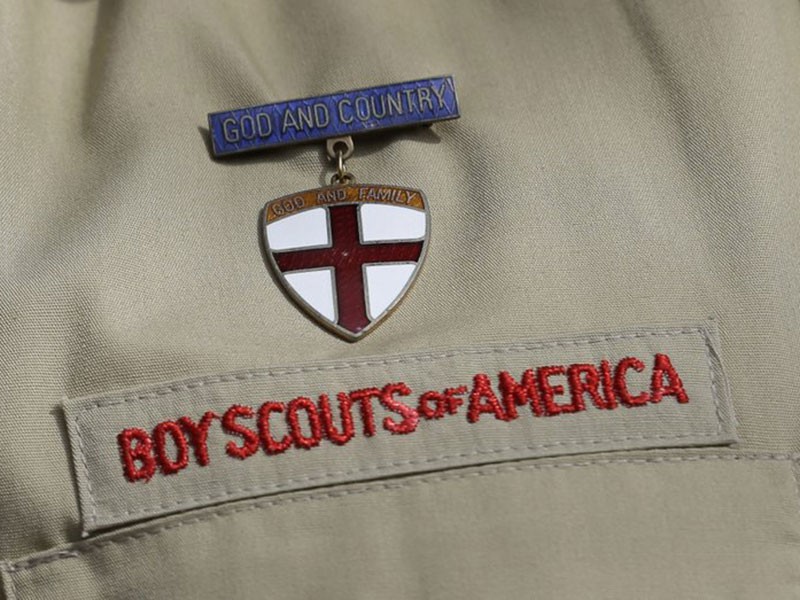The Boy Scouts of America's bankruptcy reorganization plan submitted Monday leaves many unanswered questions about how it will resolve tens of thousands of sexual abuse claims by former Boy Scouts.
Among the suits is one filed in 2016 by Robert William Lawson III of Gainesville, who accused a former Gainesville scoutmaster of raping him when he was teenager in 1985. The suit alleges that the scoutmaster, R. Fleming Weaver Jr., raped Lawson on a scouting event at Camp Rainey Mountain.
While Lawson's suit claims he was abused several times over a weekend at the camp, it also contends others were abused at the scout facility behind the church. Weaver served as a Scoutmaster from 1969 until 1981 at Troop 26 which is sponsored by First Baptist Church of Gainesville.
Lawson's suit is one of 1,000 that have been filed in the bankruptcy case.
The reorganization plan was filed Monday in Delaware bankruptcy court, even though the scouting organization remains in intense negotiations with insurers who face substantial exposure for the sexual abuse claims and with the officials committee representing abuse victims.
The plan calls for a $300 million contribution from the Boy Scouts’ 250-odd local councils into a trust for abuse victims, although the form and timing of those contributions remain up in the air. But the organization says it needs $75 million of those funds to continue operating. The rest will go into a trust fund to pay victims.
The BSA also has agreed to contribute its collection of Norman Rockwell paintings to the fund, and to sell a warehouse facility in North Carolina, a Scouting University facility in Texas, and rights to oil and gas interests on properties in 17 states.
Lawson called the plan "insulting" in an interview with The Atlanta Journal-Constitution.
"“It’s not a good faith starting point,” Lawson, 50, told the paper. Lawson currently serves on the survivor's Torts Claimant Committee, which was appointed by the U.S. Department of Justice to represent the victims in the bankruptcy case.
Paul Mones, an attorney representing Lawson and hundreds of other former Scouts, called the plan “woefully and tragically inadequate.”
“The problem is that the Boy Scouts are not willing to dig deep enough for the deep pain they caused,” he told the Associated Press. "They are shifting the responsibility to the insurance companies, creating a situation for the survivors to engage in obviously protracted litigation to obtain the just compensation they deserve. The BSA basically wants to walk away unscathed from this.”
The Boy Scouts of America, based in Irving, Texas, sought bankruptcy protection last February to halt hundreds of individual lawsuits and create a compensation fund for men who were molested as youngsters decades ago by scoutmasters or other leaders.
The councils, which run day-to-day operations for local troops, are not listed as debtors in the bankruptcy and are considered by the Boy Scouts to be legally separate entities, even though they share insurance policies and are considered “related parties” in the bankruptcy case.
In the Gainesville case, the church, Boy Scouts of America, the Northeast Georgia Council and others are named as defendants.
The lawsuit acknowledged church and local scout leadership removed Weaver from participating in Troop 26 activities in the early 80's, but claimed he was not publicly implicated or reported to law enforcement.
Lawson's civil suit also claimed Weaver, "continued to volunteer with the Boy Scouts and the NGC by serving with the Order of the Arrow, Scouting’s National Honor Society."
Before the bankruptcy filing, the BSA had been named in about 275 lawsuits and told insurers it was aware of another 1,400 claims. The number of lawsuits has more than tripled in the past year to roughly 860 cases in more than 110 state and federal courts. Some 600 of the lawsuits were filed after the Boy Scouts asked the bankruptcy judge for a preliminary injunction halting lawsuits against local councils and sponsoring organizations.
Lawyers for the BSA’s insurance companies have argued that they should be allowed to serve document requests on 1,400 people who have filed sexual abuse claims and to question scores of them under oath to determine whether there has been widespread fraud in the claims process. The judge has yet to rule on that request.









